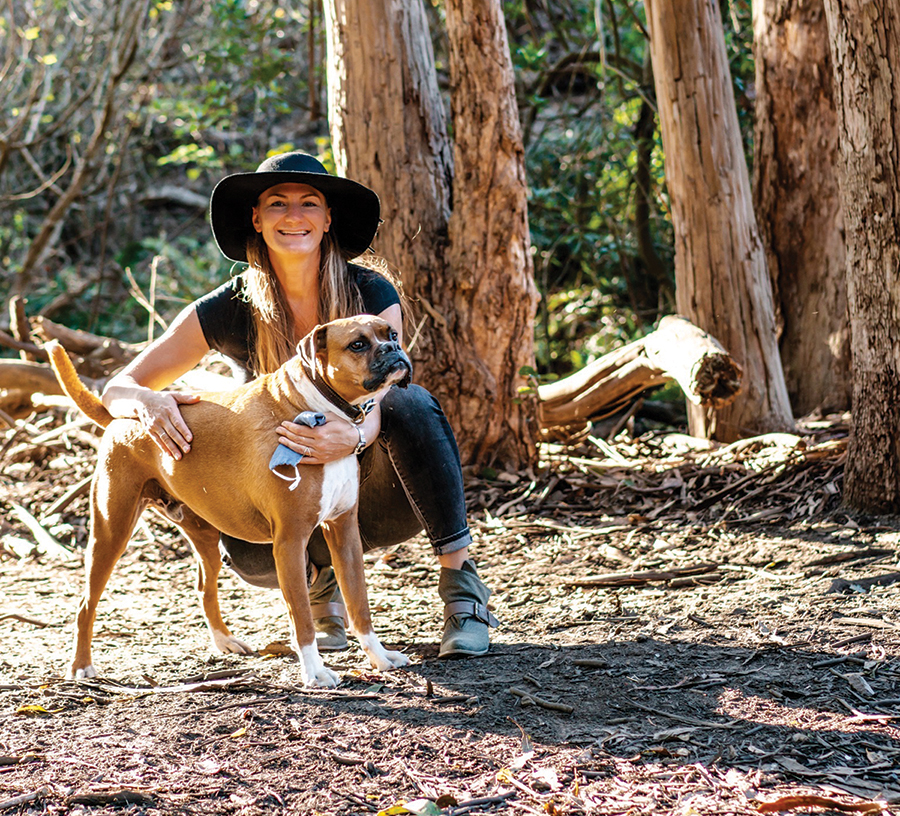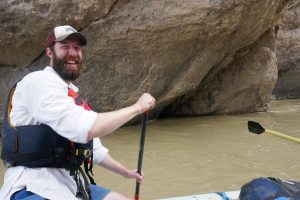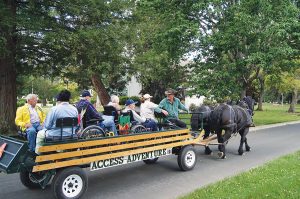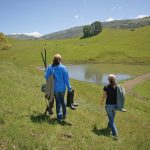
Outdoor recreation has been key to veteran Maury Argento overcoming post-traumatic stress disorder and depression. Photo by Bhavya Thyagarajan Photography.
United States Army veteran Maury Argento prefers to get her exercise outside. Sometimes she hikes with her family, but more often than not this businesswoman and mom climbs San Francisco’s hills and outdoor stairways with her two dogs and infant child. Captain Argento has been out of the military for nearly 15 years, after having served for six years with specializations in weapons of mass destruction and communications. Primarily stationed in Germany, she was also deployed to a Saudi Arabia combat zone for a time, and after returning to civilian life was diagnosed with post-traumatic stress disorder (PTSD) and depression. “I was on medication, but the most effective thing for me has always been exercise and being outdoors. I suffer substantially if I don’t get exercise and get outside,” she said.
Argento found her way outdoors for healing, but not all vets do. More of them may be following in her footsteps, however, thanks to the Accelerating Veterans Recovery Outdoors (AVRO) Act. Authored by Congressman Chris Smith (New Jersey), AVRO was included in the Veteran’s COMPACT Act, a broader legislative package passed by the House of Representatives in September 2020. The Sierra Club was one of more than 120 organizations that endorsed the House bill. It recently passed the Senate on the eve of Veteran’s Day.
If signed by the president, AVRO will require that the Secretary of Veterans Affairs establish a task force to recommend ways to connect veterans with outdoor recreation as a form of medical therapy. “By identifying and eliminating barriers for veterans to access public lands, the Accelerating Veterans Recovery Outdoors Act will ensure that veterans can heal on the landscapes they served to protect,” said Robert Vessels, campaign manager for the Sierra Club Military Outdoors program, in a press release from Senator Catherine Cortez Masto (Nevada), the author of the Senate’s version of the bill. Some of the barriers the task force would likely address include transportation, park fees, lack of knowledge about where to go, and the need for childcare and family-friendly events.
According to the U.S. Census Bureau, the veteran population stands at 17.4 million, and many of them have dealt with lingering psychological effects from their service. The Department of Veterans Affairs reports that as many as 20 percent of Operation Iraqi Freedom and Operation Enduring Freedom veterans, and 12 percent of Desert Storm veterans, have PTSD in a given year. Thirty percent of Vietnam vets have had PTSD in their lifetimes. Symptoms can include trouble sleeping, functioning in normal activities, flashbacks of disturbing memories, and the inability to relate to others.

Rob Vessels is campaign manager for the Sierra Club Military Outdoors program. Photo courtesy Rob Vessels.
The Sierra Club’s Vessels was 18 years old when he joined the military. He spent five years as an infantryman in the army, including 25 months deployed to Afghanistan and Baghdad during the surge. Upon completing his service, he went into a deep depression and couldn’t relate to anyone back home in Indiana. “My transition story is pretty common. I pretty quickly became an alcoholic, and struggled with my mental health,” he said.
His dad steered him to the Department of Veterans Affairs, and Vessels tried an array of different medications, but his turning point came when he moved to California with an army buddy. “Just being around someone with a shared experience, and having access to wild spaces and the outdoors, was a pretty immediate turn-around for my well-being,” he said, while adding that he will likely have to deal with his mental health struggles for the rest of his life. As a kid, he had gone car camping with his family, but didn’t discover outdoor recreation as a form of healing and solace until he got out of the military.
He studied Arabic at a community college in Ventura while also camping and hanging out at the beach. “Just listening to the waves crash is really meditative,” Vessels said. He transferred to UC Berkeley, where he earned a degree in Middle Eastern studies, and frequently headed for the Desolation Wilderness west of Lake Tahoe with a backpack and his dog.
“It’s the ability to disconnect from the noise of normal life and the five-minute news cycle. If you’re out for multiple days, it’s rediscovering that circadian rhythm, just waking up with the sun, creating the day, doing whatever you want to do really, and going to sleep with the stars. There’s something about that that helps me reset,” Vessels said. The Sierra Club Military Outdoors program has taken thousands of veterans on excursions, including backpacking, whitewater rafting, hiking, or simply geocaching at parks.
Argento prefers exercising outdoors for several reasons, even before the pandemic shut the gyms. “I pretty much stopped going to the gym when I was in the military. There are so few women, you get way too much attention that is not welcome and not enjoyable. The outdoors was a much safer, and fresher, option,” she said.
Argento is a sports massage therapist now, and recommends that her clients run on dirt or barefoot in sand. “Veterans ran in boots for so many years that our feet are all screwed up,” she said. When running on trails or in the sand, your stabilizer muscles engage, which doesn’t happen on a treadmill, she added. Getting outside also offers fresh air, vitamin D, and a break from screen time, all of which are good for everyone.

Using horse-drawn carriages, Access Adventure provides the opportunity for veterans and other individuals with physical challenges to have outdoor experiences. Photo courtesy Access Adventure.
Depression and PTSD are maladies that aren’t necessarily visible to others, but some veterans have to deal with physical injuries as well. There are many organizations that help those veterans in different ways. Suisun City-based nonprofit Access Adventure gets those with physical challenges outside on specially crafted, horse-drawn carriages. Michael Muir, Access Adventure’s founder, is the great grandson of John Muir, the first president of the Sierra Club. Through Access Adventure, Muir has provided carriage rides for older vets for years at the Veteran’s Home of California in Yountville, and for his next endeavor plans to teach injured vets coming back from Iraq and Afghanistan to drive carriages. Although not a veteran himself, Muir has lived with multiple sclerosis since the age of 15, and knows the thrill of outdoor adventure through competitive carriage driving, which he has done — and won — for years. “When you’re able-bodied one minute, and paraplegic or minus your legs the next, there’s an incredible adjustment to make,” Muir said. “It would thrill me to take a veteran, and show him or her how exciting this sport can be, and how amazing it is that a horse can compensate for your lost function. That’s the thing for these younger vets, to convince them that their life can still be full and exciting and worth living,” Muir said.
Vessels sees AVRO as a “first step towards normalizing outdoor recreation and time spent outdoors as a legitimate means to improve your wellbeing. And with the pandemic, I don’t think it’s ever been more clear how important getting outdoors is to our mental and emotional wellbeing.”
Aleta George covers open space for the Monitor.

